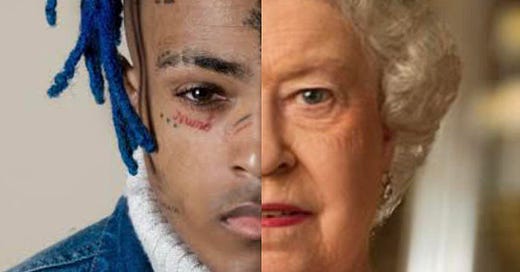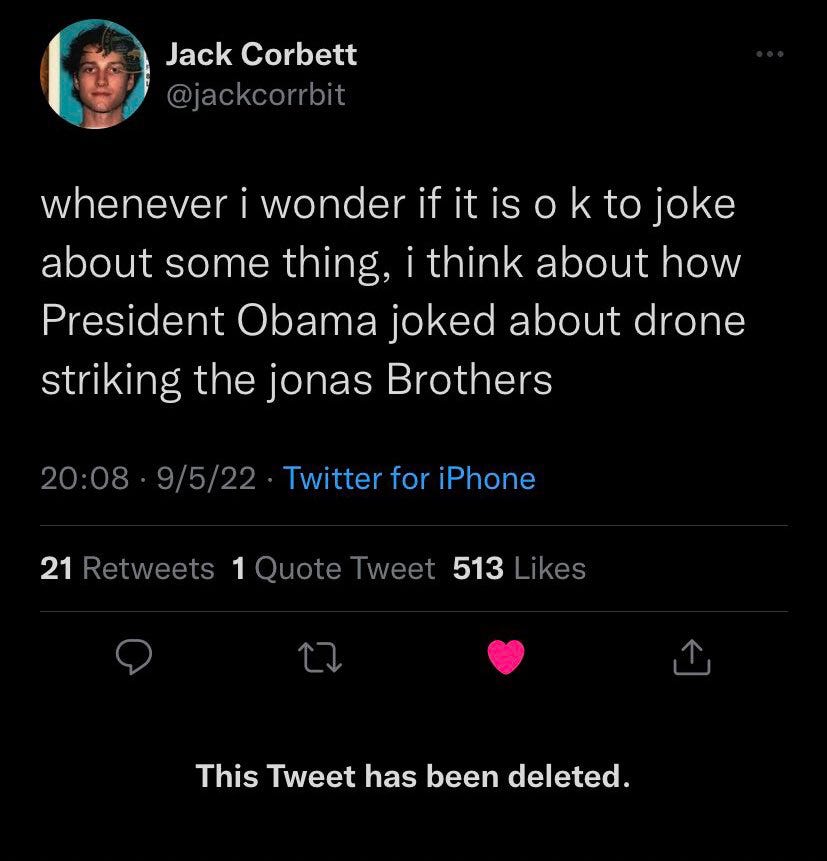the memeification of tragedy
or, why queen elizabeth's face keeps being combined with xxtentacion's
The cake comes out at 8:46 p.m. on Sunday, Sept. 11, ushered into a Brooklyn living room adorned with pink and blue streamers by the happy birthday song.
“Happy birthday to you, happy birthday to you. Happy birthday, 9/11, happy birthday to you.”
Then comes the gender reveal.
With footage of the Twin Towers falling projected onto two makeshift towers as a backdrop, a cradle with two baby dolls is unveiled, and someone announces:
THEY’RE NON-BINARY! Raucous laughter and applause.
That was the main event at Ana’s 9/11 gender reveal party, which was recorded and she shared on her Instagram page @neoliberalhell. The reactions were mixed.
“It was half people being like, ‘It's inappropriate to joke about this,’ and then half people being like, 'This is cringe, I’m too post-ironic to appreciate this, it’s all for attention,’” she told me.
While that’s perhaps an extreme example, the sentiment was far from an outlier. Meme accounts run by young Americans all came together on 9/11 to post their sardonic takes on the tragedy and the rampant jingoism that took hold in the aftermath.
“It’s making fun of how much of a chokehold this one tragedy has had over the country for the last 20 years when we commit war crimes that kill that many people bimonthly. It’s not #NeverForget the drone strike that happened two months ago,” Ana said. “Making fun of it obviously sparks outrage, but it also sparks discourse.”
It’s a classic example of manufactured consent, Ana said, as mass media and the government have removed the terrorist act from any wider context and placed it on a pedestal to try and avoid any meaningful analysis or accountability.
Just a few days earlier, internet users worldwide joined forces to mock mourners of Queen Elizabeth II, who died at 96 two days before 9/11, as well as theorize her potential reincarnation as Trisha Paytas’ baby.
Kelsey Weekman, an internet culture reporter at Buzzfeed News, said dark humor has always been a part of the online world, but these days the content mill moves faster – and with more dexterity.
“It might have taken us a few days in the past to joke about the Queen's death, but I think we got to that point immediately because people are thinking ahead to the next step,” she said.
“Most trends reach a point of reckoning when people realize that something is actually bad (or not as good as you think) and people who are really internet literate are skipping directly to that stage and thinking more deeply about what they're posting.”
For the most part, Ana said her audience is in on the jokes and understands the difference between critique and callousness.
The over-the-top nature of the party proceedings parodied the swell of patriotism generated by the deadliest terrorist attack on American soil, Ana said, and the way Americans want to relive it every year. The gender reveal component highlights the parallels between reveals gone wrong and the terrorist attack, a kind of ouroboros connecting one decade’s culture war to the next’s.
“I’m usually communicating with other people that understand the message I'm trying to send, and so we can laugh together and critique the same things together,” Ana said.
Not every meme about the death of a monarch or a national tragedy is a critique, though.
“There are people who are being edgy just to be edgy. People who are trying to make a point politically. People who have been emotionally affected by the situation. People who want to stand out in a broader conversation. People who are trying to laugh instead of cry. People who just want to laugh at whatever the meme du jour is. People who just want to be a part of something,” Weekman said.
Pushing boundaries means there are still boundaries, even for non-humorous takes on the current discourse.
After Uju Anya, an associate language professor at Carnegie Mellon University, tweeted, “I heard the chief monarch of a thieving raping genocidal empire is finally dying. May her pain be excruciating,” she drew the ire of her employer, Amazon CEO Jeff Bezos and trolls flooding her inbox with death threats. Twitter removed the tweet.
Anya doubled down on Twitter and in an interview with the Cut, saying she would not express remorse and that respect for the dead is used as leverage against oppressed people to silence them. As a Nigerian born in the aftermath of the country’s civil war, Anya has experienced firsthand the consequences of British rule (which only ended in 1960).
“In my tweet, I did not wish her death. I did not tell anyone to kill her. I said nothing except wishing her the pain in death that she caused for millions of people. As a direct recipient of her governance and as the child of colonial subjects, I reserve the right to say what this woman’s life and monarchy and the history of the British monarchy as a whole means to me,” she told The Cut.
Though it is not always popular to go against the grain, Weekman said that it was interesting how quickly people came to the defense of those like Anya.
“As we examine our parasocial relationships with public figures, I think it's cool that people have taken a step back to look at how power doesn't make people perfect. It all goes back to how influence works in our lives,” Weekman said.
Everything we see online – from memes to infographics – influences the way we process current events, she said, which in turn affects what we learn from them and ultimately how history will portray them.
“They definitely aren't some fleeting thing, though we zoom through them these days,” she said.
Ana said the rapid-fire consumption rate, in an age where everything and everyone can be recorded, allows us to bear witness to every atrocity the world has to offer in high definition.
“It definitely creates a cynicism and a separation and numbs us all to tragedy. I guess we have more of an understanding of how awful things really are and therefore are more comfortable joking about it,” she said.










